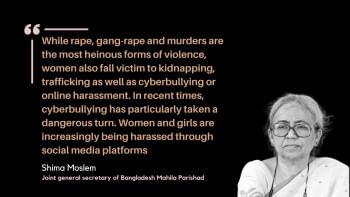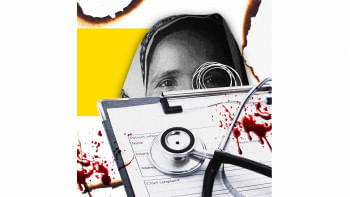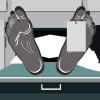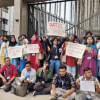The violence of silencing a rape survivor

We must come to terms with the reality that we live in a country where a woman seeking medical assistance at a One-Stop Crisis Centre, after allegedly being raped by an upazila chairman, can be "abducted" in broad daylight by a group of 10-12 men, in front of the media and human rights activists, with no repercussions at all. The confounding details, for those not following the story, is such: the young woman, an honours student from Dumuria upazila in Khulna, was admitted to the OCC of Khulna Medical College Hospital at around 11pm on Saturday. There, she told her doctors that she had been raped by the Dumuria upazila chairman, Ejaz Ahmed, earlier that evening at his office in Shahpur Bazar. When asked whether she wanted to file a case, she said she did not trust the police to take her case seriously and would only do so through a court.
The next day, she was discharged by the hospital at around 4:30pm. Outside the OCC, local human rights activists and the media were waiting to offer her legal support and record her story. But before they could speak to her, a group of men, led by Rudhagra Union Parishad Chairman Gazi Touhidduzaman—also nephew of the alleged rapist—blocked their way. A video of the incident shows that the men essentially pushed the survivor and her mother into the vehicle, shoving aside and assaulting the journalists and activists who tried to stop them from leaving. According to The Daily Star's Khulna correspondent, who was present at the site, the locals managed to apprehend Touhiduzzaman, who could not get into the microbus amid the commotion, and essentially held him hostage till the police traced the woman and her mother.
Forced to take some action, police apparently located the vehicle somewhere in Jashore and instructed them to come back with the mother-daughter duo. After a five-hour wait, the two were returned to the police station, where the seemingly distraught woman declared in front of journalists that she had "voluntarily" gotten into the car. When asked whether she had been raped, she said she was too sick to comment on it further. The police then let them go. One woman and several young men who brought them back said they were taking them home. When the local correspondents checked on them the next day, their family members claimed they did not return home. The police, meanwhile, say they have nothing to do on the matter since no case has been filed.
That justice for rape survivors is a mirage in this country is no news, with a miserable conviction rate of three percent in rape cases. We know about insensitive policing that detracts women and girls from seeking justice in the first place, the victim-blaming that takes place at every step of the process, and the long and painful wait for a verdict—with the cost of the proceedings raking up with each postponed hearing—when one knows that it is likely to set the perpetrator free in the end. We know how women and their families who dare to take on the cases are humiliated, harassed and threatened by the rapists and their supporters—from neighbours to village power brokers to state institutions, such as law enforcement agencies and local government bodies. And when the perpetrator is someone closely or even remotely associated with power, the very act of demanding justice is tantamount to seeking a life sentence for oneself, with the system posed to protect the perpetrator at every step of the way.
It is, thus, hardly a surprise that the woman did not want to file a case with police, and by the way police acted in the preceding debacle—as if they are passive bystanders who don't have a constitutional duty to act when they see injustice and criminal activities taking place in front of them—she was right to think she would get no help from them if she named the upazila chairman as the perpetrator. One does not need a vivid imagination to infer what she must have faced in the five hours that she remained missing and the conclusions she was forced to come to; and yet, the police have taken the woman's word at face value. Had local journalists and activists not apprehended the chairman's nephew during the alleged abduction, the police would probably not even have tracked the vehicle in question.
And what does it say about our rape crisis support that a survivor doesn't even have the minimum level of privacy or security to walk out of there in peace? It is worth asking how the alleged perpetrator's men got to know about the accusation unless information was leaked from the OCC or the police station itself. The local media was apparently "tipped off" by their internal sources, as, we assume, were the men who showed up the next day. While the OCC should prioritise the victim's needs and privacy, and provide protective custody/shelter if and as needed, we are horrified that whatever was shared with the doctors and support staff became public knowledge even before the survivor could come to a decision about whether to file a case or not.
Now, the woman's extended family, who initially had told the media that she had indeed been raped, has changed their tune, claiming that it was all a misunderstanding. No doubt there's a huge incentive––whether negative, positive or both—for such a change of heart. As for the survivor, she is apparently at a relative's house in a neighbouring village from where the family plans to marry her off to a suitable groom.
And so a dramatic story comes to a tragic but predictable end. We won't know the extent of the violence inflicted upon her (if any). We won't be privy to the insurmountable trauma that she must bear throughout her life, denied even the bare minimum of the right to seek justice for an inexcusable crime committed against her. We won't find out whether she was mentally or physically tortured in the five hours she was in the vehicle for speaking out her truth. And we won't know how much pressure she must be facing from her family, the chairman's men and state-backed apparatuses to withdraw whatever allegation she had the audacity to make in the first place.
Sure, we cannot know whether the chairman really did rape her—and the real tragedy is that we probably never will.
Sushmita S Preetha is op-ed editor at The Daily Star.
Follow The Daily Star Opinion on Facebook for the latest opinions, commentaries and analyses by experts and professionals. To contribute your article or letter to The Daily Star Opinion, see our guidelines for submission.

 For all latest news, follow The Daily Star's Google News channel.
For all latest news, follow The Daily Star's Google News channel. 











Comments